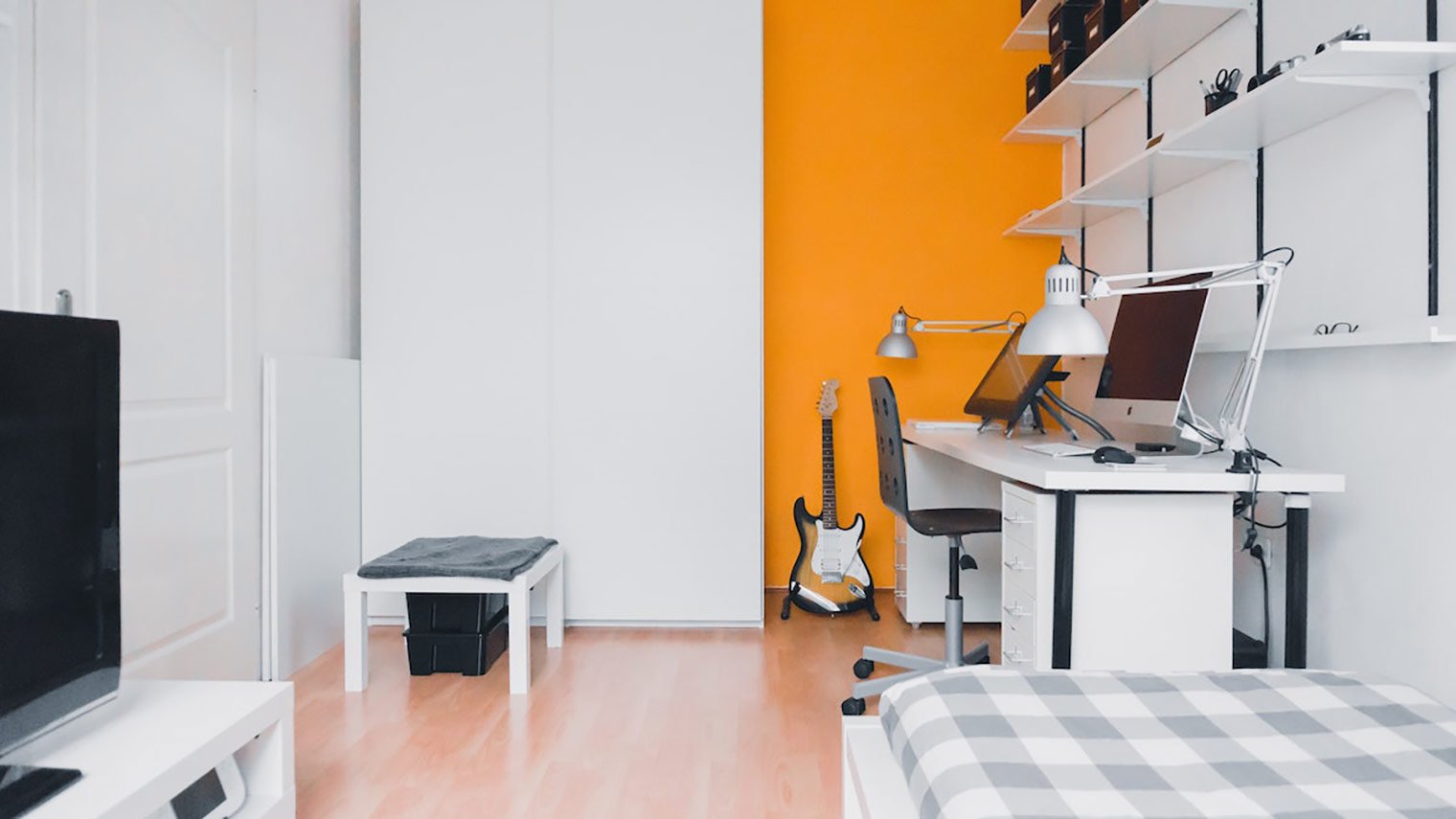The Ultimate Student Accommodation Guide: Everything you need to know about finding and securing student accommodation

www.accommodationforstudents.com has been helping students to find accommodation for 22 years. We have used our years of experience to put together the ultimate guide to finding student accommodation. Use our tips to make sure you are ahead in the race to get the best place to live and to find out about one thing you can do to help you save hundreds of pounds.
1. Which type of accommodation is best for you?
When you start looking for accommodation it is important to understand what is going to be the best accommodation for you. As a student you really have four options:
Halls of Residence
Owned and managed by the University and are generally full of first year students. They are a great way to adjust to living away from home and making new friends. There are a variety of options including catered/self-catered and ensuite/shared bathrooms. On average you can expect to pay £152 per week for this type of accommodation (£212 in London).
House/Flat Share
This is the most common type of private accommodation for students after year one, where you can rent a property with friends. If you’re considering this, Accommodation For Students, has the largest selection of properties available in cities all over the country. You will pay around £88 per week for a shared house rising to £129 in London. Remember, you may also have to factor in utility bills if you choose this option, which will add a bit to your weekly cost.

Private Halls of Residence
These properties tend to be similar to University owned halls of residence, except they’re open to everyone, and are generally more expensive as they often have a better level of amenities. The contracts will vary from 40 weeks to 52 weeks and, as they’re independent, you will be sharing with a diverse mix of people from a range of Universities – perfect if you like meeting new people! Expect to pay £156 per week and well over £259 per week in London.
Room in a private house
This is where you rent a room in a house where the landlord currently lives. Whilst this probably isn’t the type of accommodation you imagined during your Uni days, it can provide a useful stop gap option if you’ve left it late looking for private rented housing.
Once you know what type of accommodation you are looking for the next important decision is to decide when to start your search.
2. When to start looking for accommodation
This is one of those topics where everyone has an opinion, but there really is no one right answer. The team at www.accommodationforstudents.com suggest you start looking when you are ready to. The benefit of starting to look for your accommodation early is that you will have the widest choice and range of options available to you. If you want to leave it till later then you will be able to find a place to live, but you won’t have the range of choice and may have to compromise.
It is also worth knowing that some cities have more student accommodation available than others. If you are lucky enough to be in one of those cities it means that you can be more relaxed in your approach to your search. As the amount of available accommodation can vary each year it is worth checking what the situation is in your city. We have a team of helpful advisors who can talk you through this, just call our Freephone and number and find out what the situation is in your city. The number is 0800 078 9659.

New to University?
If you are a new applicant to University you will normally be offered accommodation with your application and this will be finalised when your offer is confirmed. If you are late applicant or gain your place through the clearing process it is still likely that you will be offered University Accommodation. However it is probable that you will be allocated the less desirable options. Students that have been through this process generally advise that you at least check what alternatives are available to you on www.accommodationforstudents.com.
1st year +
When you are looking to move on from halls into shared housing, you will notice that many people will start looking for accommodation as early as October or November. Feedback from students is that getting the best properties at the best price does require any early start. However, if you are still quite new to University we suggest holding off until at least January or February. In that way you can get a great place to live, but you have a bit more time to get to know your potential housemates, before you commit to spending a year with them.
3. How to save time by narrowing down your options
Once you have decided what type of accommodation you are looking for and have made the decision to start the search you need to focus your activity. The more focused you are the faster you will find the right place. The three most important criteria are:
Price
The amount of rent you want to pay is ultimately going to pay a key role in you accommodation search. There are a wide variety of options here, as the cost of rent will vary significantly, depending on the type of accommodation you chose and the location. A house or flat share will cost on average £88 per week, while a hall will cost £152 (University) or £156 (Private). However, the amount you will pay will also be determined by where you live. Living in London will cost you £259 per week in a private hall and £129 per week in a shared house. Given that accommodation is one of your biggest expenses it is worth factoring this in if you are considering studying in the Capital or a more expensive city such as Exeter, Aberdeen or Brighton.
Both University owned and Private Halls of Residence will include your utilities within the rent in most cases. It is also much more common for landlords and agents to include at least some utility bills within the rent for shared housing. Last year 60% of those listed on Accommodation For Students had bills included and this added about £12 per week to the average weekly rent.
If you end up renting a house or flat that does not include bills we suggest you get a quick quote for your student utility bills here. Instead of one tenant being responsible for obtaining the money for bills off other tenants and paying it all themselves The Student Energy Group ensures that each tenant pays for their share of the bills only, meaning you won’t have to worry if one tenant doesn’t pay up.
Location
Most students tell us that location is the most important aspect of their accommodation. In general students want to live close to the place that they study, so that they can walk to class each day.
Location is generally a significant advantage to University Halls which are located on or close to the University Campus. Private Halls of Residence are also normally near a University.
Houseshares are generally a bit further away and may involve a short bus ride or journey to class. It is common for certain areas within University towns and cities to have dense pockets of student housing, which can provide vibrant and attractive student centres of their own. Over the years our students have written extensively about these student neighbourhoods and you can read all about them on www.accommodationforstudents.com.
Amenities
High speed, high quality broadband has become important to most students as the basics of a bed, table and kitchen. As you might expect, the level and quality of the amenities in your student home will be determined by you budgeting decision. The more you pay the more you will get, with some Private Halls offering gyms, cinema rooms and private bars! Ultimately this is a budget based decision.
4. The vital importance of the people you live with
If you want to live in a Hall, whether University owned or Private, you won’t really have much of a choice of housemate. Part of the appeal of such places is that you might get to meet lots of new people, but still be able to retreat to the relative sanctuary of your own room. Bear in mind that if you are new to University, the people you meet in Halls are likely to those who you spend most time with early on, so try and find out as much as you can about the Hall before you choose it.
The people are more important than the property
However, it you want to live in a house share, choosing your housemates is almost as important as choosing your house. In fact, in a recent survey by Accommodation For Students 65% of students said that the people they live with were more important than the actual property itself.
So if you’re moving into a house share, it’s extremely important to ensure that you’re living with the right group of people, as it can be the difference between either having an amazing year at University or an experience so bad you’re counting down the days until you can leave.
Before you commit to a group it is worth making sure you are compatible. It is vital you all have the same idea on how much you want to spend on rent and useful if you have a similar outlook on social activity and cleanliness.

Remember YOU decide when to look
This is where it does make sense to take your time, particularly if you are a first year student moving on from University Halls. There’s often a lot of pressure to secure a house by Christmas, meaning you could end up deciding who you will be living with after a few months of your first term. However, there are still houses available in most cities up until the end of May, so don’t rush into making decisions that you don’t have to. On balance, our advice would be to compromise on your choice of houses rather than your choice of housemates.
Now you have made the key decisions, you are ready to start searching. In the next sections we suggest the best ways to go about the search, how to secure your house and our must do tip that could save you hundreds of pounds.
5. How and where to search for the perfect place to live
This is where www.accommodationforstudents.com comes into its own. There is the full range of accommodation options available to you on the website. Furthermore, once you find something that you like you can make direct contact with the property to find out more. While it might seem obvious, all of the places on the site are just for students.
This is important because there are many ‘student’ accommodation websites out there that list non-student accommodation, which might mean that you end up living in a non-student area. Also they tend to list a limited range of accommodation choices – for example just Private Halls, which will limit your search from the outset.
While you should find everything you need through Accommodation for Students you might also want to try the University accommodation office, many of which publish lists of properties available at certain times of year. Each town will also have a range of student specialist letting agents, which are often clustered together, if searching online is not your thing.

6. Making sure it's the right place for you
When you have found some places that meet the criteria you have selected, you really need to organise a viewing. It might seem like a pain, but students who view the property before moving in to it are happier with their accommodation than those that did not.
This might not be possible with a Hall, where you will be more reliant on the online presence, reviews and where possible a skype viewing, but viewing a house share is essential.
In addition to having a good look around the place, here a few questions to ask the landlord.
- How long has the property been on the market? If the house/flat has been available for a while, it could indicate that there is something wrong with it. The longer it’s been advertised, the more likely you are able to negotiate deals.
- How much is the deposit and is it protected? Generally, the deposit will be around 1 month’s rent. In most (but not all) cases the landlord or agent is legally obliged to protect your deposit in an official scheme. Think carefully about renting if the landlord does not protect the deposit.
- What is the length of contract and does it need a guarantor? Most contracts are between 40 and 52 weeks in length. Be clear about the length and that once signed you are committed to it. Many landlords or agents will require you to provide a guarantor for your rent.
- Is the property accredited? Has the landlord signed up to one of the student accommodation codes or are the part of one of the voluntary schemes that exist.
- What do the current tenants think? If you are lucky enough to have a viewing when the current tenants are in the property, this is a great chance to ask some more questions. The two most important are:
- How professional and reliable is the landlord? Does the landlord fix any problems quickly and efficiently, and are they good communicators? You probably won’t want to live in a house if maintenance issues arise and the landlord can’t be bothered to sort it out. The better the landlord or agent the more likely you are to have a positive experience living in the property.
- What are the neighbours like? Are they fellow students or families? If you’re surrounded by families, you’ll have to accept the fact that you won’t be able to throw wild parties every week. Also, find out if the neighbours are friendly, or prefer to keep themselves-to-themselves – that way, you can determine your relationship with them.
Once you have found the right place the next step is to sign up for the property. Getting this right is vital and could save you lots of money
7. Signing the contract, the do's and don'ts
When you choose to take the property, most of the time you will be presented with an Assured Shorthold Tenancy (AST) Agreement. This is the contract that tenants must sign to confirm that they will be renting the property.
An AST generally lasts between 6 months and 3 years, although the majority are for around 12 months.
You must read this agreement as it will contain all of the information you will need to ensure a successful tenancy and to give you the best chance of getting your deposit back when you leave the property.
Once you have signed the agreement you will be liable for the rent for the property throughout the duration of the tenancy period you have committed to, even if you do not live there. Therefore, you must not sign the agreement unless you are certain you have the right place to live.
Note: In Scotland you are likely to sign a private residential tenancy agreement. These are different to AST’s as they do not include a fixed length or date they end. You can find out more about these agreements here.
Paying a deposit
There are two different types of deposits to be aware of when renting a property, to ensure that you fully understand all of the costs you are paying.

Holding Deposit
This is the sum of money paid to a landlord or letting agent to reserve a rental property before the signing of a tenancy agreement – in other words, it takes the property off the market so no one else can get it. A holding deposit is normally non-refundable if you wish to withdraw your application for tenancy. Some private halls of residence will call this a booking fee and will convert this into a dilapidation deposit when you occupy the room. Note: the maximum amount that can be charged is 1 week’s rent and it is not legal to request a holding deposit in Scotland.
Tenancy Deposit
This is the amount of money held by the landlord throughout the tenancy; and will be used at the end of the tenancy if any repairs, maintenance and/or cleaning is required by fault of the tenants, to bring the property back to the condition it was in at the commencement of the tenancy. The sum of money can vary, but is capped at 5 weeks rent in England and two month’s rent in Scotland. If the house has been let in a satisfactory condition, the money will be returned back to you.
The Tenancy Deposit Scheme (TDS) forces landlords to protect their tenants’ deposits with one of the three authorised schemes. At the end of the tenancy, the Landlord must return the deposit to the tenant, or pass it over to the authorised scheme and register a dispute. The scheme will provide a free alternative dispute resolution service, but if either the landlord or tenant(s) do not agree to this, then the dispute will be resolved in the courts. Landlords must tell their tenants within 30 days of moving in which scheme the deposit has been registered with.
Note: In some circumstances landlords may not be required to protect the deposit, for example if they are renting a room in their own primary residence. It is important to check what the landlord plans to do with your deposit you are looking for somewhere to live. We would normally recommend thinking very carefully about choosing to live in accommodation where the landlord has taken steps to avoid protecting the tenancy deposit.
Guarantors
It is now common to be asked to provide a Guarantor when renting any type of student property. This is because most students do not have a credit history that can be easily checked and the majority of landlords want to make sure the people they are renting to can afford the rent.
As a result it is likely you will be asked to provide a Guarantor. Most students use a parent or family member, who are generally happy to take on the relatively onerous responsibilities of acting as Guarantor. As you landlord, or agent will want the Guarantor to be UK-based and have minimum levels of income not everyone is eligible to be a guarantor. In such circumstances you will be asked to pay all or some of your rent in advance. The alternative is to use a Guarantor company like Housing Hand who will act for you for a small fee.

Inventory
Make sure you get an inventory when you move in. An inventory is a record of the contents and condition of a property at a specified date. It is an extremely important document as it can be used to settle disputes at the end of the tenancy regarding deposits. If you have one in place you are much less likely to become involved in a dispute over the return of your deposit.
In our latest student guide we highlight the importance of an inventory when you move out of your accommodation. Our recent research revealed that 70% of students were not provided with the vital document. Here are some important things to be aware of:
- You should be provided with an inventory at the beginning of the tenancy.
- Many inventories contain a clause stating that if you don’t request amendments within seven days, you are deemed to have accepted the contents of the document.
- Take your time going through each section of the inventory, and take note of any imperfections, even something as trivial as a small scuff on the wall. If the landlord is at the property whilst this is being carried out, make sure you point out any issues.
- If your landlord doesn’t provide you with an inventory, take photographs to email to them, along with a list of any existing damage to the property and its contents.
- Any disputes about the deposit at the end of the tenancy will be resolved by reference to the inventory, so make sure it is carried out as accurately – and in as much detail – as possible.
We also recommend taking pictures of your room and any common areas you are responsible for just before you move out – so you have a record of the state of property before you vacated it.
Now you have followed these steps you should be in your ideal student accommodation and be perfectly set up for the year ahead.